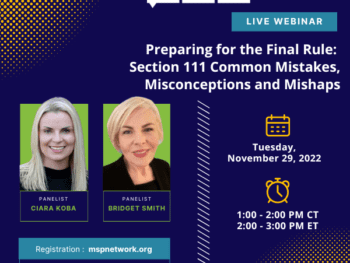
For many reasons, Medicare may deny reimbursement of a medical bill related to the occupational injury. The injured individual will receive a letter stating the claim has been denied because the MSA funds should have been used first.
“We are seeing these letters going out at this point, and in the future, I think we may see even more of these letters,” said John Kane, VP of Strategy at Ametros, a professional administrator. “It’s important to know that this is on Medicare’s radar through section 111 reporting, as well as they’ve taken a stance in terms of benefit coordination – if, for some reason, there’s funds available in that MSA they do expect that that injured individual is going to pay for it first.”
As Kane and two colleagues revealed during a recent webinar, there is incontrovertible evidence that Medicare is pulling out all the stops to ensure it does not pay for medical services that are rightfully the responsibility of another entity. In addition to releasing and explaining the findings of their recent study, the speakers explained precisely what needs to happen to ensure injured individuals are not caught in the crosshairs of the federal agency.
Study
“For a number of years, the Centers for Medicare and Medicaid Services (CMS) had been telling us, ‘we’re denying cases,’” said Jayson Gallant, Sr. Strategic Account Executive. “We at Ametros were not seeing that because we were doing the work we were supposed to do.”
Gallant and Shawn Deane, General Counsel and SVP of Risk Management & Compliance embarked on a study to find out what was actually happening. Partnering with researchers at the Research Data Assistance Center, a CMS contractor, they looked at about 5 percent of the MSAs that CMS had approved for 2018 – 2020 and, specifically, the denials within that group.
“On a three-year average … around 34,000 claims per year were denied,” Gallant said. “That’s spread across about 12,000 Medicare beneficiaries.”
The study’s authors wanted to know why these denials were happening. They dug down to see if decisions were being made haphazardly or if CMS actually uses a process to determine whether to reimburse for these claims.
Decision Dependent on Steps in Settlement Process
The Medicare administrative contractor, or MAC, decides whether to accept a claim. That decision is largely dependent on certain steps taken during the settlement process:
- The Responsible Reporting Entity RRE (the party responsible for funding a claim) must inform the Benefits Coordination & Recovery Center (BCRC) of the settlement and the amount, including the MSA.
- The BCRC, which is tasked with ensuring Medicare gets repaid for conditional payments, then places a ‘marker’ on the injured individual’s working file.
- Post settlement, the injured individual must send in an annual attestation letter explaining their precise use of the MSA funds. If at any point in time the MSA funds are exhausted, the injured individual must send a separate letter to the BCRC explaining that, in order to receive reimbursement from Medicare for treating the occupational injury.
- The exhaustion attestation letter triggers an update on the injured individual’s working file, which lets the MAC know it is OK to approve the claim. But if this letter is not received by the BCRC, the marker remains on the person’s file and the claim will be denied.
“The folks with BCRC confirmed that when MACs are looking at claims and whether or not they should take over, they do check the common working files to see if someone has properly exhausted [their funds] and submitted that,” Gallant explained. “The main thing to take away from the study data is that Medicare has a formal process in place and they are not just denying claims.”
It is, therefore, critically important for injured individuals to send in the annual attestation within the specific timeframe, as well as exhaustion attestations. Keeping track of how and when MSA expenditures are made in a given year and submitting the information timely is one of many challenges facing injured individuals who settle their workers’ compensation claims. Those who fail to adhere to the various rules and regulations run the risk of interrupting their continuation of care, either temporarily or even permanently.
Managing the MSA
Because of the complexities of handling settlement funds – especially when MSAs are included, CMS has “highly recommended” that injured individuals use professional administrators instead of trying to self-administer these funds. Experienced professional administrators are experts at ensuring compliance with Medicare. Top-tier organizations also provide invaluable discounts on treatments and prescription medications to help stretch the funds.
Nevertheless, the vast majority – at least 90 percent – of settled claims are self-administered. “I think it’s a terrible disservice to a settling individual who’s been in the throes of the workers’ compensation system for years to set them off with a pot of money with between $50,000 and $150,000, if not more. It’s difficult to expect that they are going to succeed and excel in a treatment ecosystem that is set up to take insurance. They are set up to fail when they need to present their MSA to providers and expect them to take the workers’ compensation fee schedule, negotiate bills, coordinate their care, go through the various record-keeping requirements associated with CMS guidelines, send in attestation information within 30 days of the anniversary of the settlement, and ensure that all expenditures from that account are used only for Medicare-covered expenses that are casually related to their injury,” said Shawn Deane, General Counsel & SVP of Risk Management & Compliance of Ametros.
The speakers hope that anyone involved in settling a claim with an injured individual will consider the study and their subsequent webinar. For example, some may feel that administering the MSA is not as important as protecting Medicare’s interests and that CMS does not really deny claims.
“I think that’s a bad philosophy to take because of what the data reflects,” Deane said. “It reflects that it is happening, and Medicare is paying attention to it. If you look at the study, there are documents out there, documentation from Medicare that outlines the specific codes that get placed in a beneficiary’s working file when there is a submitted MSA, and there’s a very specific procedure that Medicare goes through in which they utilize the attestation information to code the working file to coordinate benefits post settlement properly. And given the strain on the Medicare Trust, it’s an easy way for CMS to ensure that they’re not paying when an MSA is available to pay for those funds.”
The findings from this study should be eye-opening for everyone involved in the workers’ compensation settlement process. To learn more about how denials are impacting the treatment of individuals after settlement and how to help them take precautions, download the official study here or watch the webinar recapping the study on demand.
 Author Michael Stack, CEO Amaxx LLC. He is an expert in workers’ compensation cost containment systems and helps employers reduce their workers’ comp costs by 20% to 50%. He works as a consultant to large and mid-market clients, is a co-author of Your Ultimate Guide To Mastering Workers Comp Costs, a comprehensive step-by-step manual of cost containment strategies based on hands-on field experience, and is the founder & lead trainer of Amaxx Workers’ Comp Training Center, which offers the Certified Master of Workers’ Compensation national designation.
Author Michael Stack, CEO Amaxx LLC. He is an expert in workers’ compensation cost containment systems and helps employers reduce their workers’ comp costs by 20% to 50%. He works as a consultant to large and mid-market clients, is a co-author of Your Ultimate Guide To Mastering Workers Comp Costs, a comprehensive step-by-step manual of cost containment strategies based on hands-on field experience, and is the founder & lead trainer of Amaxx Workers’ Comp Training Center, which offers the Certified Master of Workers’ Compensation national designation.
Contact: mstack@reduceyourworkerscomp.com.
Workers’ Comp Roundup Blog: http://blog.reduceyourworkerscomp.com/
©2022 Amaxx LLC. All rights reserved under International Copyright Law.
Do not use this information without independent verification. All state laws vary. You should consult with your insurance broker, attorney, or qualified professional.














